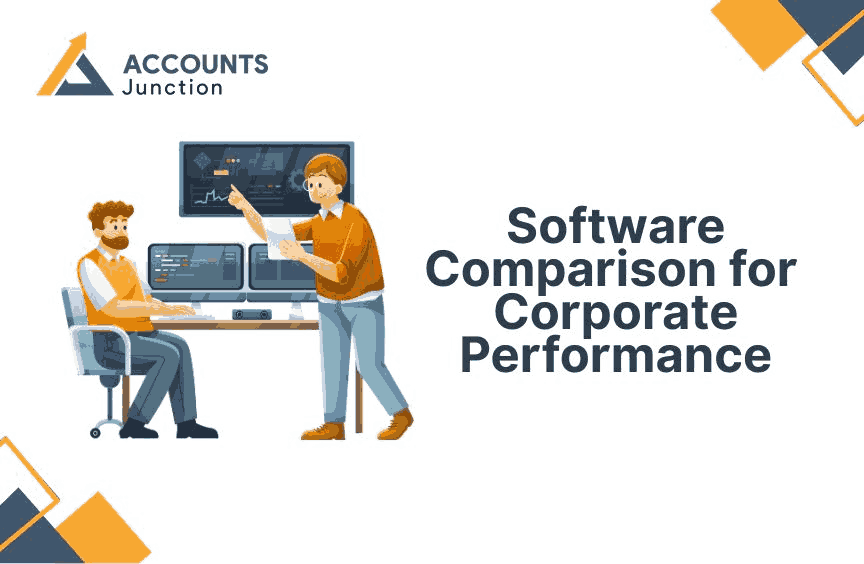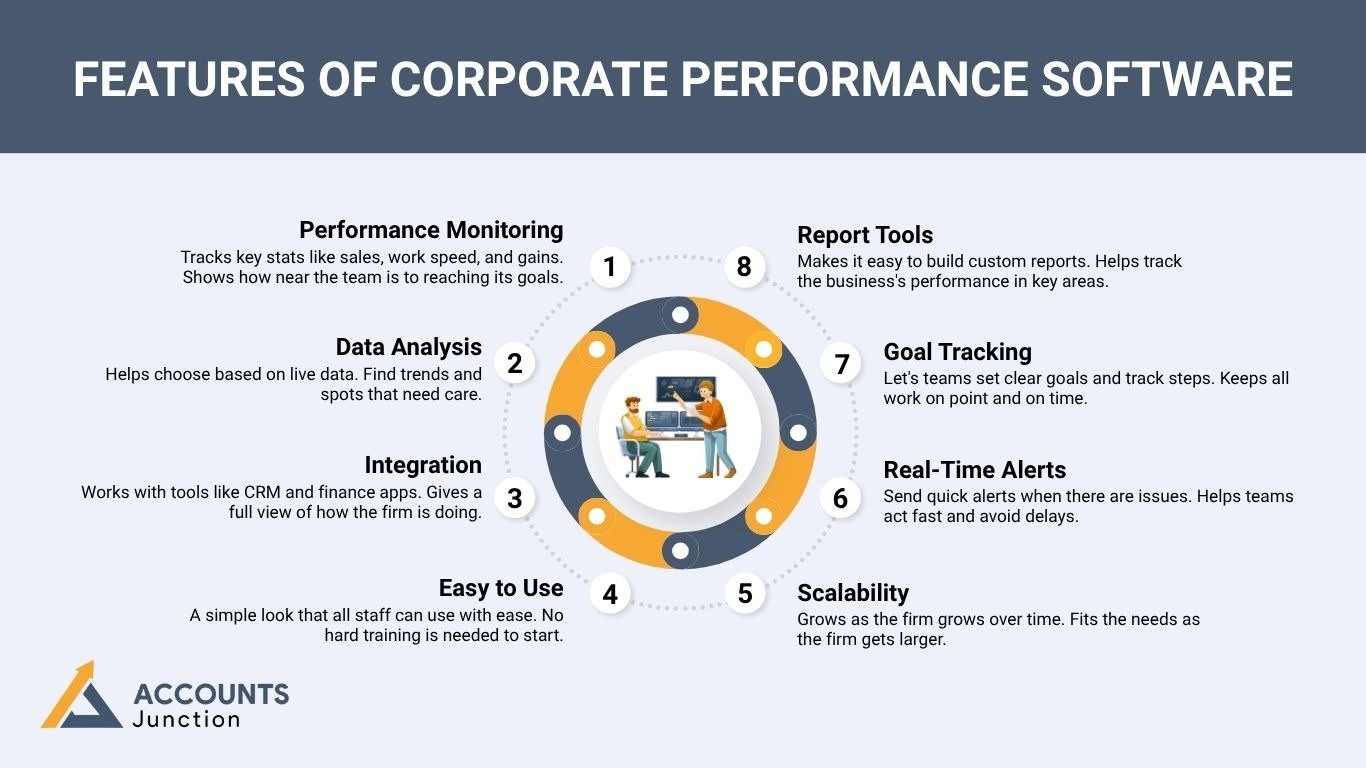
Software Comparison for Corporate Performance
Selecting the right software for corporate performance is key for every business. It helps boost work, track goals, and make smart choices. The right tool helps firms improve, meet goals, and grow. In this blog, we will review corporate performance tools, like Oracle Enterprise Manager, to find the best fit for your needs. Software comparison can help you in picking the best tool for your business.
When choosing software, it’s important to know your business needs. Each firm is unique, so the tool you pick should match your goals. Top software is easy to use, low in cost, and grows with your team. We will look at different types of software and show how they can help your business thrive.
What is Corporate Performance Software?
Corporate performance software helps businesses track key metrics. It measures how well the business is doing. These tools help set goals and see how close the company is to reaching them.
- Tracks Important Metrics: Monitors key business data.
- Reports and Dashboards: Shows business performance in simple reports.
- Goal Tracking: Helps set and check progress on business goals.
- Real-Time Updates: Shows live data so managers can act fast on changes or problems.
- Team Performance Monitoring: Tracks how teams and staff work to make sure all goals stay on track.
- Alerts and Notifications: Sends notes or alerts when goals are missed or problems come up.
Features of Corporate Performance Software
- Performance Monitoring
Tracks key stats like sales, work speed, and gains. Shows how near the team is to reaching its goals. - Data Analysis
Helps choose based on live data. Find trends and spots that need care. - Integration
Works with tools like CRM and finance apps. Gives a full view of how the firm is doing. - Easy to Use
A simple look that all staff can use with ease. No hard training is needed to start. - Scalability
Grows as the firm grows over time. Fits the needs as the firm gets larger. - Real-Time Alerts
Send quick alerts when there are issues. Helps teams act fast and avoid delays. - Goal Tracking
Let's teams set clear goals and track steps. Keeps all work on point and on time. - Report Tools
Makes it easy to build custom reports. Helps track the business's performance in key areas.
One prominent software for measuring performance is Oracle Enterprise Manager.
What Is Oracle Enterprise Manager?
Oracle Enterprise Manager helps control IT systems. It tracks servers, databases, and cloud services. It gives key data to keep things running.
Key Features of Oracle Enterprise Manager
- Comprehensive Monitoring
Tracks the health of IT systems in real-time. It ensures servers, databases, and cloud services run smoothly and gives early warnings of issues to prevent problems. - Automation
Automates tasks to cut time and reduce mistakes. It makes IT management faster and more reliable, allowing teams to focus on important tasks. - Data Analytics
Gives clear views of the system's work. It helps firms track data and make choices using true, live information. - Scalability
Works for businesses of all sizes. It can grow with your company, adapting to the changing needs of your IT infrastructure. - Security and Compliance
Keeps IT data safe with strong security tools. It helps firms meet rules and keep key data protected.
Comparing Oracle Enterprise Manager with Other Corporate Performance Software
With a clear software comparison, you can find tools that fit your needs and budget. Making the right choice starts with a smart software comparison. There are many tools available in the market. Here’s how Oracle Enterprise Manager stacks up to other top picks.
|
Feature |
Oracle Enterprise Manager |
SAP BusinessObjects |
Microsoft Power BI |
IBM Cognos Analytics |
Workday Adaptive Planning |
Zoho Analytics |
|
Focus Area |
IT system management |
Business intelligence and reporting |
Data analysis and visualization |
Business intelligence and reporting |
Financial planning and budgeting |
Reporting and data analysis |
|
Best For |
Large businesses with complex IT needs |
Companies needing deep data reports |
Creating dashboards and reports |
Businesses focused on performance analytics |
Financial forecasting and budgeting |
Small to medium-sized businesses |
|
Real-time Data |
Yes |
Yes |
Yes |
Yes |
No |
Yes |
|
Automation |
Yes, for IT tasks |
No |
No |
No |
Yes (for financial planning) |
No |
|
Scalability |
High |
Moderate |
High |
Moderate |
Moderate |
Moderate |
|
Integration |
Excellent with Oracle products |
Moderate |
High with Microsoft tools |
Moderate |
Moderate |
High (especially with CRM) |
|
User-Friendliness |
Moderate (IT expertise needed) |
Moderate |
Very Easy |
Moderate |
Easy (for financial users) |
Very Easy |
|
Cost |
High (Enterprise level pricing) |
High |
Affordable (Free basic version) |
High |
Moderate |
Affordable |
|
Security & Compliance |
Yes |
Limited |
Limited |
Limited |
Limited |
Limited |
|
Ideal For |
IT-heavy companies |
Data-intensive organizations |
Data analysis for all businesses |
Performance management-focused firms |
Finance-focused businesses |
Small and medium businesses |

Types of Software for Corporate Performance
1. Business Intelligence (BI) Software
-
BI tools help read data and show how a company is doing. Popular tools: Microsoft Power BI, Tableau, Qlik Sense.
2. Enterprise Resource Planning (ERP) Software
- ERP tools link business areas like money, people, and supply into one place. Common ERP tools: SAP ERP, Oracle ERP Cloud, Microsoft Dynamics 365.
3. Performance Management Software
- These tools track staff goals and link teamwork to business aims. Examples: Workday, SuccessFactors, 15Five.
4. Monitoring and Management Software: Oracle Enterprise Manager
- Oracle Enterprise Manager helps watch and control IT systems. It keeps IT work smooth and cuts down time loss, helping the firm's growth.
5. Customer Relationship Management (CRM) Software
- CRM software helps manage customer ties. It tracks leads, sales, and satisfaction, helping firms build stronger bonds.
- Popular tools: Salesforce, HubSpot, Zoho CRM.
6. Collaboration Software
- These tools help teams share files, chat live, and manage tasks. They boost teamwork and improve communication. Examples: Slack, Microsoft Teams, Trello.
How to choose Software for Corporate Performance
1. Ease of Use
- Pick tools that are simple to use. Hard tools can slow work and hurt output.
2. Customization
- Pick tools that fit your firm’s needs. Look for tools with custom views and reports.
3. Cost
- Think about what the tool will cost. Some tools are cheap, some cost more but give more value. Make sure the tool fits your spending plan and goals.
4. Integration
- Pick tools that work with your CRM, HR, or money tools. This keeps data in sync across your firm.
5. Scalability
- Your tools should grow with your firm. Pick tools that can take more work, users, and data as you grow.
Benefits of using Corporate Performance Software
Better Decisions
- Real-time data helps managers make smart choices. It gives leaders the info they need to match business goals.
Clear Goals
- Helps businesses set clear goals and track progress. Measurable metrics keep teams on the same page.
More Efficiency
- Automates tasks to save time. This frees up workers to focus on more important tasks, increasing productivity.
Better Teamwork
- Teams use shared data to work as one. This boosts communication and aligns efforts across groups.
Cost Savings
- Cuts costs by improving work. Finding flaws helps reduce expenses and raise profits.
Choosing the right software helps improve work speed. Oracle Enterprise Manager fits big firms with complex IT tasks. Small firms may pick Power BI or SAP Business. Accounts Junction helps with day-to-day money work. By checking your needs, we can help you choose the tool that fits your business goals. We help you integrate all types of business management tools. Contact us now and get support with the best business management tool for your business.
FAQs
1. What is corporate performance software?
- Corporate performance software tracks key metrics and helps make smart choices.
2. How does Oracle Enterprise Manager improve corporate performance?
- Oracle Enterprise Manager checks IT systems, runs tasks, and shows key data.
3. Is Oracle Enterprise Manager good for small businesses?
- Oracle Enterprise Manager is best for large companies with complex IT systems.
4. What are the benefits of corporate performance software?
- Corporate software tracks goals, helps with decisions, and boosts work.
5. How does SAP BusinessObjects compare to Oracle Enterprise Manager?
- SAP BusinessObjects is for data. Oracle Manager is for IT.
6. Can corporate performance software integrate with other business tools?
- Yes, it can integrate with tools like CRM, HR, and financial systems.
7. How do I choose the right corporate performance software?
- Choose software based on your company’s needs, size, and goals. Look for software that fits your business.
8. How does corporate performance software track goals clearly?
- It measures progress, flags issues, and shows where work lags.
9. What types of performance software exist?
- BI tools, ERP apps, CRM, monitoring software, and team software.
10. Can corporate performance software track both IT and business work?
- Some focus on IT, and others track all areas of the business.
11. How does automation prevent mistakes?
- It does routine tasks and reduces human errors.
12. Can corporate performance software help with finance planning?
- Yes, it links money, staff, and operations data for planning.
